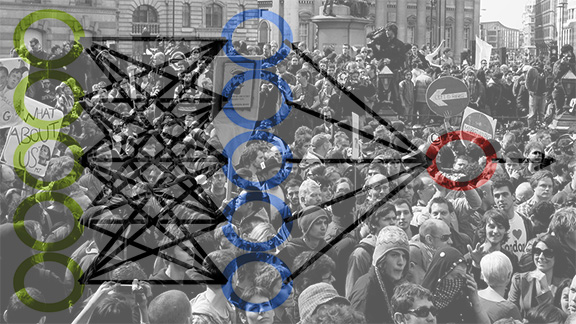 The project will use machine-learning methods to predict protest activity in countries around the world using a combination of Google query data and financial indices. Using an economic model, the researchers will translate these predictions into measures of the freedom of assembly in different countries.
The project will use machine-learning methods to predict protest activity in countries around the world using a combination of Google query data and financial indices. Using an economic model, the researchers will translate these predictions into measures of the freedom of assembly in different countries.
In collaboration with Brown’s Office of the Vice-President for Research (OVPR), DSI also made two awards to Brown researchers earlier this fall—together, these three grants are the first in DSI’s new program offering funding to promote collaborative data science research at Brown in a range of domain areas.
The DSI/OVPR grants were offered to participants in the Big Data Networking Event held in April 2018. This event brought “data generators” and “data analyzers” together, to give members of each group a chance to talk briefly with each member of the other group – a sort of speed-dating for potential collaborators. The event was sponsored by several Brown units in addition to DSI and OVPR: Brown Physicians, Inc., Advance CTR, and the COBRE Center for Computational Biology of Human Disease. Participants in that event were given the opportunity to apply for funding for a new collaborative big data project. Two proposals were selected for funding:
“Forecasting Patterns of Delirium and Early Recovery After Acute Stroke,” a project led by Michael Reznik of Rhode Island Hospital and Brown’s Warren Alpert Medical School, is a project to use sensor-generated data to develop machine learning models for predicting recovery in patients after stroke. The project brings together clinical and computational expertise with an aim to develop multi-PI grant proposals to NIH.
“Markers of Premature Biological Aging in Chronically Homeless Individuals,” from Eric Jutkowitz of the School of Public Health and colleagues, examines premature biological aging (PBA) in homeless individuals on a molecular level, in order to fill key gaps in the literature and develop pilot data (i.e., big epigenetic data) to support an R01 grant application. This work will be the first in the country to examine PBA in individuals with prolonged exposure to an environmental stress, such as homelessness.
Applications for DSI’s Data Science Grants @ Brown are accepted on a rolling basis, and we are interested in projects of any size that meet the following criteria:
- initiate a new interdisciplinary research direction or catalyze new collaborations across disciplines or units, potentially leading to a competitive external grant proposal;
- advance Brown’s educational goals in data science; or
- explore the impact of the data revolution on culture, society, and social justice.
Small requests are welcome, especially if they lead to increased interdisciplinary interactions on campus and/or to larger collaborative projects.
More information about what we’ll fund and how to apply. If you have questions, please contact us.